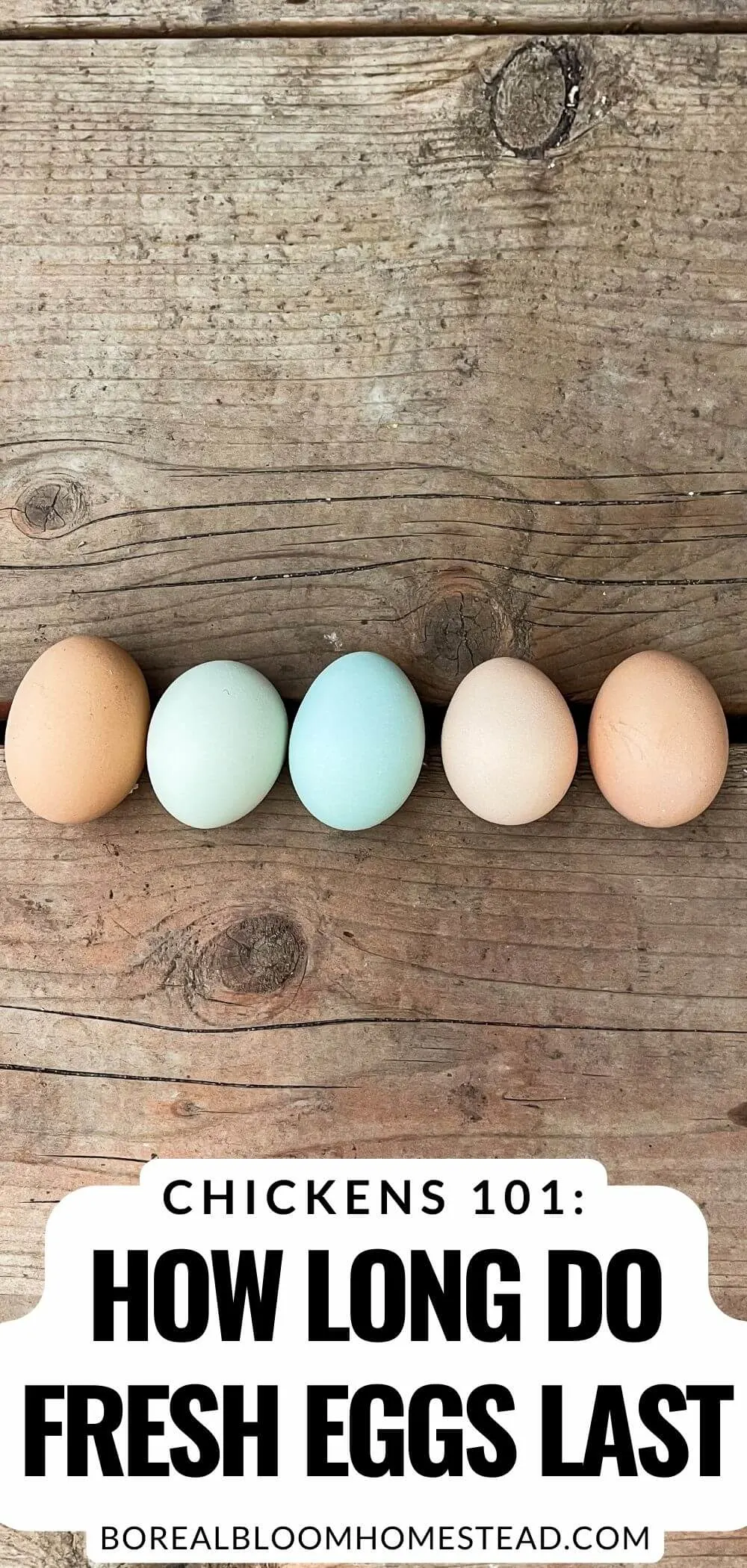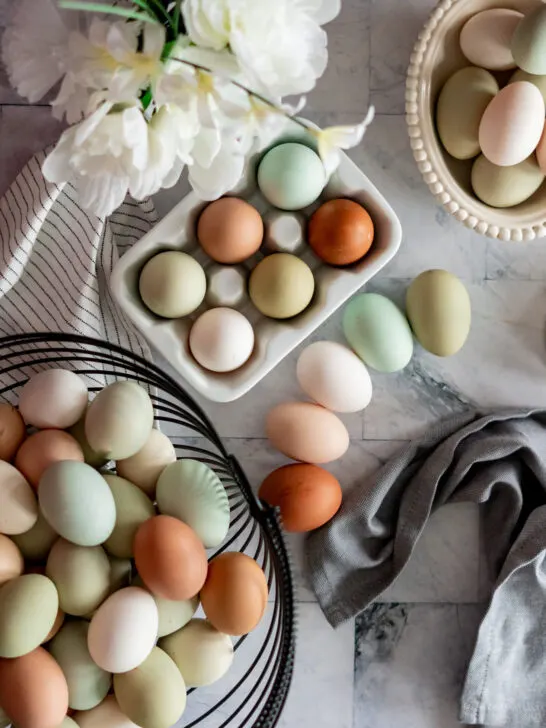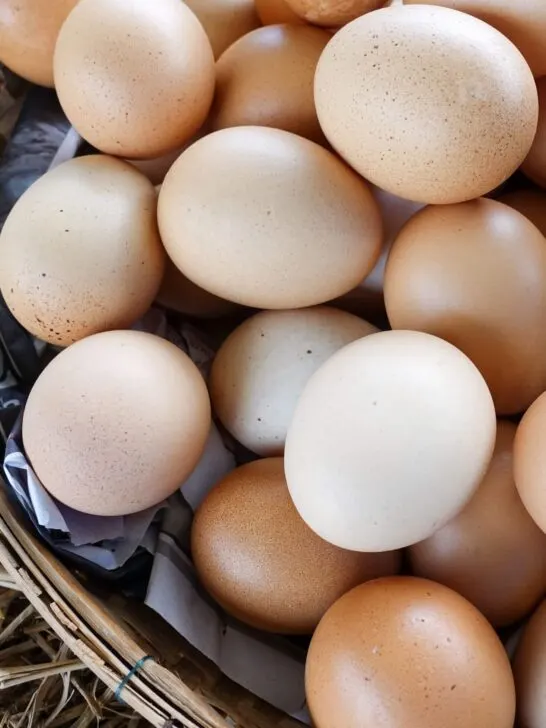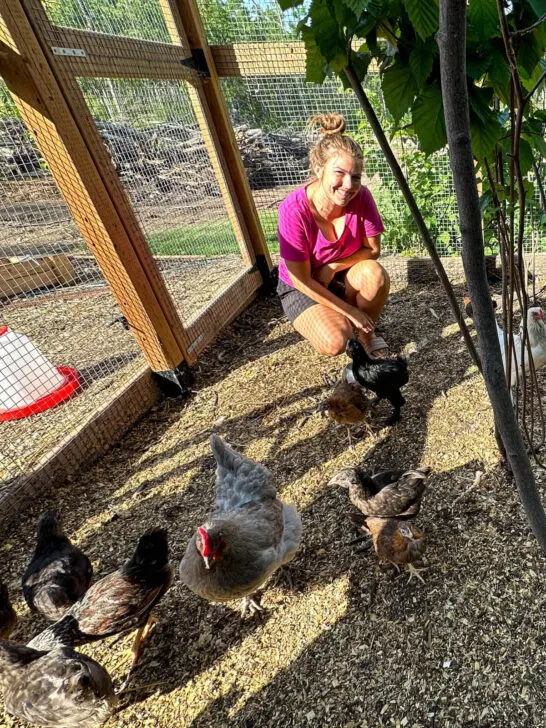Learn how long fresh eggs last from your backyard chickens or homestead hens, and how that can change based on your egg collecting habits.
Wondering about the shelf life of those farm fresh eggs you just brought home? Or perhaps you're one of the lucky ones with your own flock and you're curious how long those straight-from-the-hen eggs are good for?
Figuring out the lifespan of fresh chicken eggs can be daunting but don't worry, I'm here to help crack this egg conundrum. Whether you're plucking eggs right from the chicken coop or sourcing them from your local farmer's market, understanding their freshness timeline is key to enjoying these protein-packed gems at their best.

As an Amazon Associate I earn from qualifying purchases.
Jump to:
Tips + Tricks For Maximum Freshness:
- Washed eggs MUST be stored in the refrigerator.
- Unwashed eggs can be stored at room temperature for up to 3 weeks. This is only true if they are clean eggs with an intact bloom.
- Any refrigerated eggs, washed or unwashed, need to stay in the fridge.
- Store eggs pointed end down. This keeps the yolk and the air sack separated and slows moisture loss from the egg.
- Keep the eggs in a carton or container that allows airflow.
- Wash and refrigerate your eggs soon after laying for longest shelf life.
- Date your eggs before storing.
Love video content? I have a great video on YouTube covering how to wash fresh eggs!
How Long Are Fresh Eggs Good For?
In general, if you're getting fresh eggs straight from your chicken or from a local farmers market, you can be assured that your eggs will last between 3 and 15 weeks.
That's quite the spread, isn't it?
A lot of the longevity of your eggs will depend on your handling and storage methods.
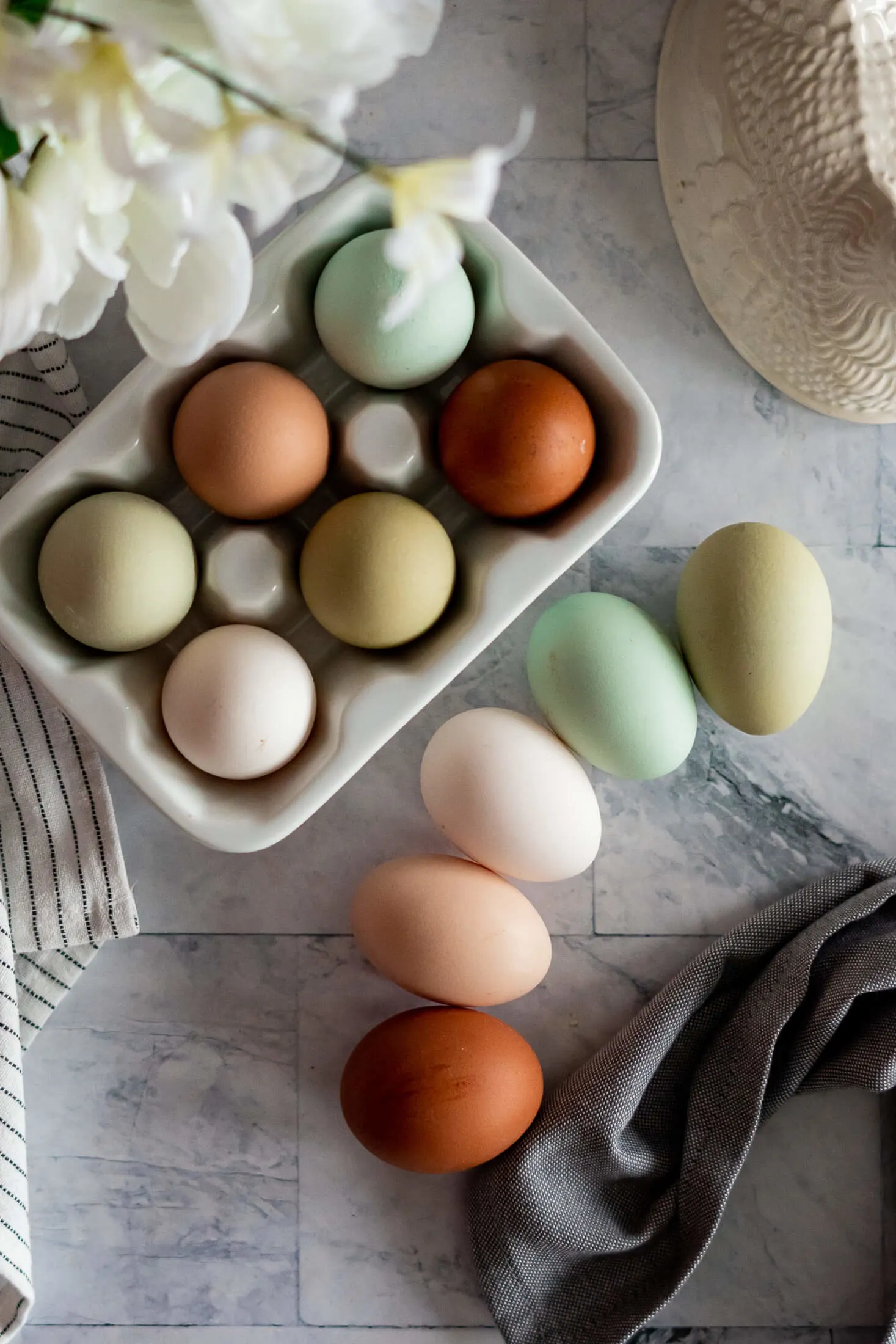
Handling Fresh Eggs
Before we get too far into how long eggs are good for, let's first touch base on your handling practices. In my opinion, whatever it's worth, proper handling practices will absolutely extend the shelf-life of your fresh eggs.
It's important to ensure you've got clean eggs right up front. There are a few great ways to ensure the eggs you collect are free of dirt, debris, and bacteria as soon as they land in the nesting box!
Clean eggs start with your chickens, purchasing healthy hatching eggs, chicks, or chickens from reputable breeders or providers can ensure they stay healthy. Keeping the chicken coop and nesting boxes clean is vitally important to their health. Healthy birds are less likely to shed bacteria on eggs and in their environment.
The next critical component is egg management. There are a few small things you can do as a chicken tender to ensure clean eggs:
- Collect the eggs at least twice a day - the more often they are collected, the more likely you'll have cleaner, fresher eggs with a reduced chance of contamination and cracked or broken eggs.
- Keeping the nesting boxes clean by removing debris and not allowing the chickens to sleep or hang out in the boxes unless they are laying is another great way to improve the likelihood of clean eggs.
- Collect eggs in two separate containers. One for clean eggs without dirt or debris and one container for dirty eggs, this helps to reduce contamination between dirty and clean eggs right at the coop.
- Wash your hands prior to collecting and handling eggs to avoid transferring unwanted germs to your fresh eggs. Don't forget to wash your hands after handling fresh unwashed eggs as well.
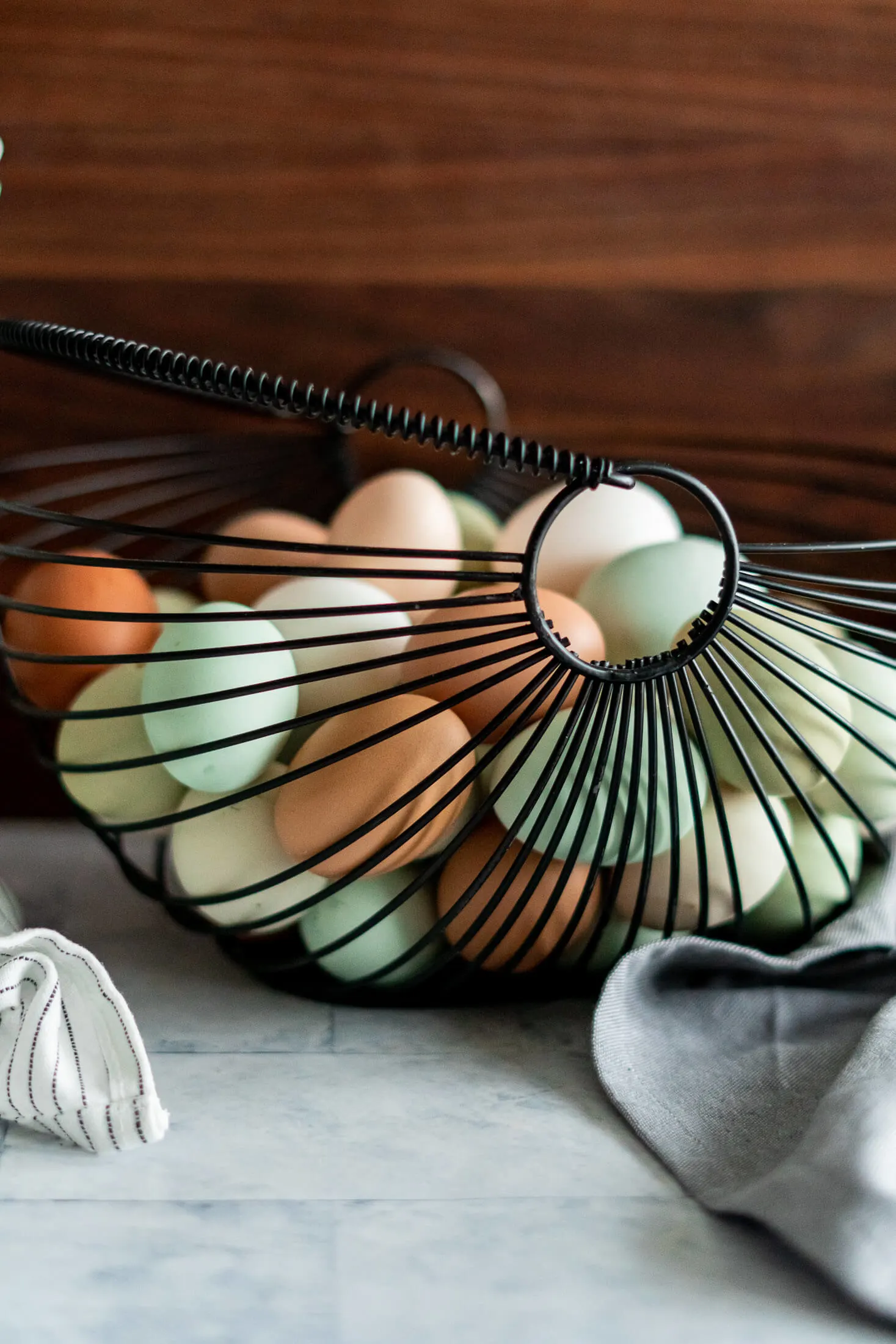
Room Temperature vs Fridge Storage
Storing Eggs On The Counter
For many chicken keepers with a small flock, keeping eggs at room temperature is a great way to store your eggs as long as you're keeping up consumption with your hens' rate of lay.
Unwashed, freshly laid eggs have what's known as a bloom or cuticle, which is a natural, invisible protective layer on the shell of the egg. It is deposited by the hen as it passes through the reproductive tract.
This bloom helps to seal and protect the egg from bacteria entering through the pores of the shell as well as reducing moisture loss from the egg. An egg's bloom helps to naturally preserve it for longer.
Eggs with the bloom intact, can be kept unwashed at room temperature for up to 3 weeks!
But this process comes with a caveat: only clean eggs should be left unwashed at room temperature for any length of time, if necessary, you can 'dry clean' these eggs by gently wiping them with a clean cloth to remove feathers or bedding.
Dirty eggs should be either washed and refrigerated or discarded. Cracked eggs should be discarded as the cracked shell may allow bacteria inside the eggs. We feed our cracked eggs to our pigs, Frank + Franc, and they love the treat!
If the temperature or humidity in your home is high, the shelf life of your eggs will be greatly reduced. They will lose freshness much more quickly in these conditions.
All About Chickens:
Storing Eggs In The Fridge
Washed eggs can last 15 weeks in the fridge, and some chicken people swear that unwashed eggs can be stored in the fridge for up to six months! The cold temperatures help to preserve the quality of eggs far beyond room temperature storage.
Eggs that have been washed must be stored in the fridge as washing eggs removes the protective bloom. Unwashed eggs that have been placed in the fridge must remain in the fridge.
Regardless of the method chosen, washed or unwashed, the refrigerator will absolutely prolong the shelf-life and maintain the freshness of your eggs. For best results get those eggs into the fridge as soon as possible!
Personal opinion alert: I think it's best to wash and store eggs in the fridge ASAP. I always wash my eggs before I put them in the fridge. On this homestead, all eggs that go in to the fridge are clean and ready to use. This prevents anyone accidentally using eggs that aren't washed.
Do Eggs Need To Be Washed Before Use?
Undoubtedly, yes.
Eggs always need to be washed before being consumed.
Washing eggs from your flock eggs helps to remove debris, dirt, and bacteria that can accumulate on the shells. Even if you collect them fresh from the nest, there is still a chance of contamination that could lead to foodborne illness.
Store bought eggs do not require washing if you're in the United States or Canada as they have been washed prior to being distributed to the stores. If you're purchasing uninspected eggs at a farmers market or from a friend, it's always a good idea to ask if the eggs are unwashed or washed at the time of purchase.
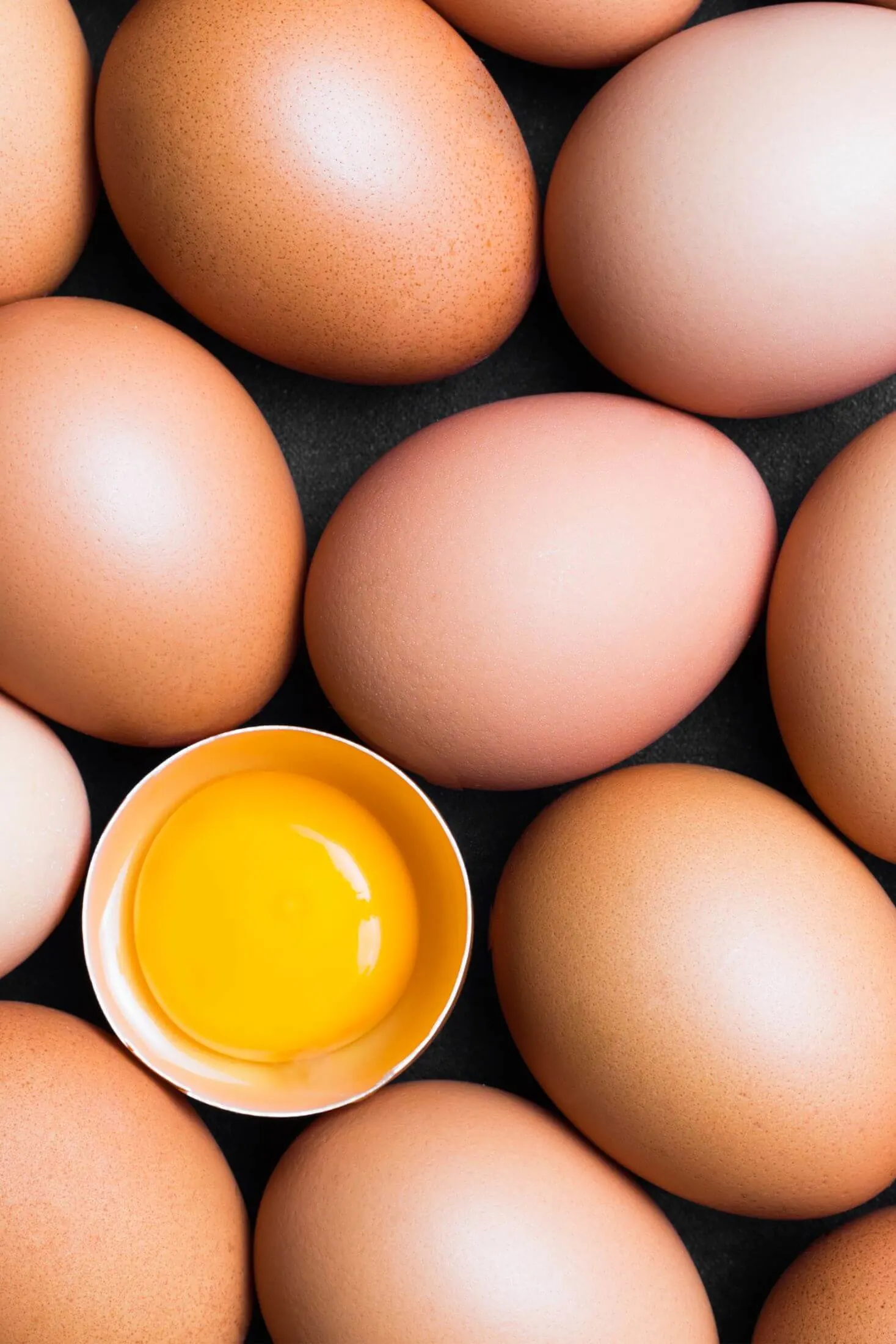
Testing Eggs For Freshness
There are a few ways to test your eggs for freshness if you're unsure:
Float Test
This is one of the most commonly suggested methods to test egg freshness.
It is said that fresh eggs will sink to the bottom of a bowl of water while older eggs will float. If an egg sinks to the bottom and lies sideways, it is very fresh. If it stands upright on the bottom, it is less fresh but still good to eat. If it floats, it indicates that air has permeated the shell and it is no longer fresh.
While this can give an idea of freshness, it's not a perfect approximation. The water test is often victim to poor interpretation and false results. Although an egg is aged, that doesn't mean it's no longer good to eat.
The float test does not indicate if the shell has been compromised by bacteria or pathogens, nor can it tell if the handler has used proper sanitation practices while collecting.
We do not use this method on the BBHomestead.
Egg White Examination
Often, you can determine the freshness of an egg by simply cracking it on a small plate and observing its characteristics.
Fresh eggs will have a thick, slightly opaque white that 'stands up' and doesn't spread on the plate. The white will stick closely to the yolk, holding it centered.
Remember, even with these visual cues, it's still important to store eggs properly and use them within the recommended time frame to ensure safety and optimum quality.
This is a great way to determine freshness and one that we use here.
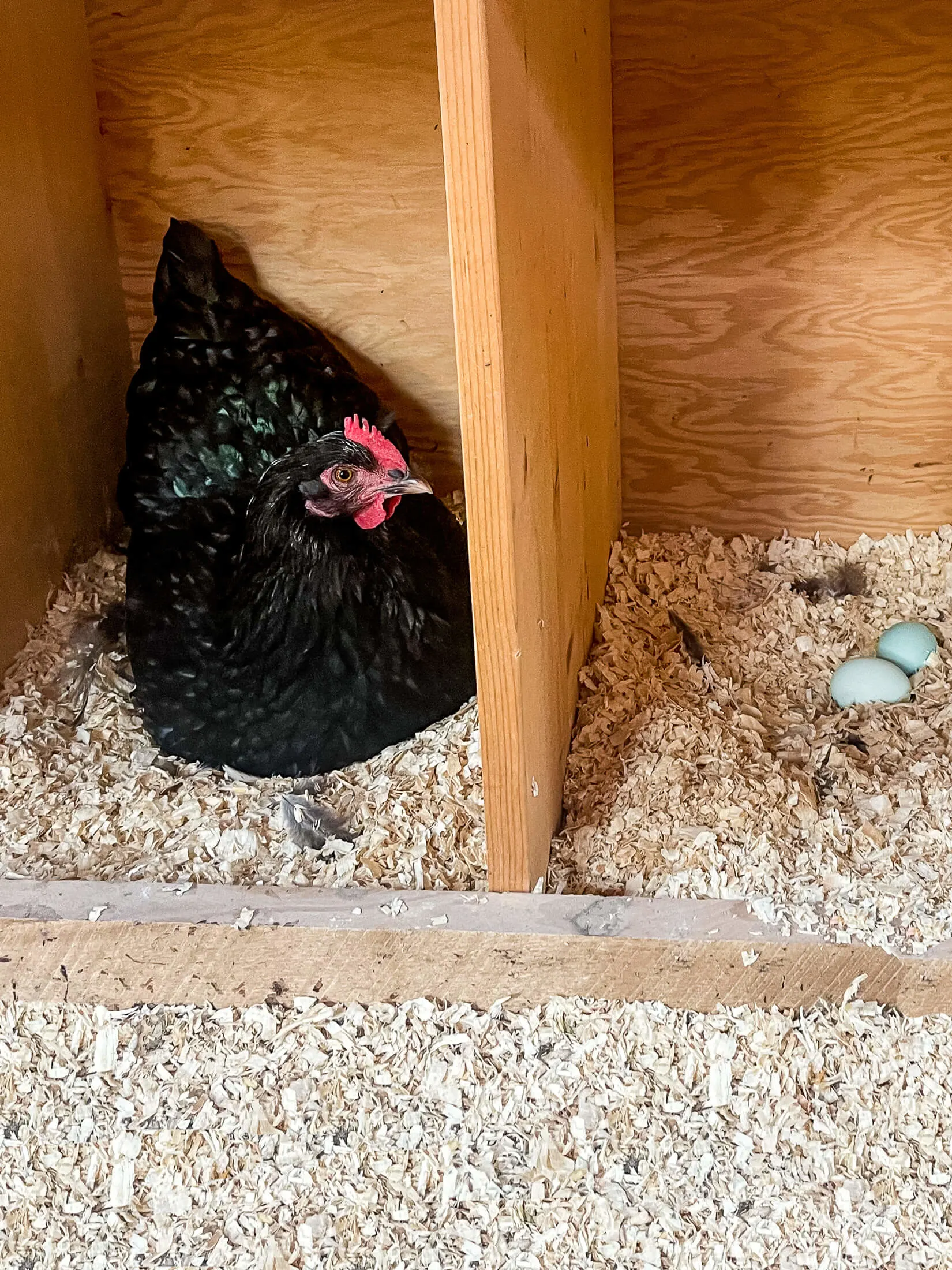
Dating The Eggs
This is the easiest method of determining freshness.
Once the eggs are collected, the date is either written on each egg individually or on the carton. We actually use a piece of marking tape stuck to the carton to date our eggs, I can cross out the date a few times before having to replace the tape. Another great option would be wet erase markers, though I haven't found any I love yet.
This allows us to keep track of when each egg was laid, and we can ensure we're using the older eggs before the newer ones - just like in your pantry; first in -> first out.
Dating eggs has a number of benefits, aside from helping determine freshness at a glance, it can help you determine which eggs are better for what cooking method; ie, older eggs for baking or hard boiled eggs, and fresher ones for poaching and frying.
This is our main method of tracking egg freshness.
FAQ
Fresh, unwashed eggs do not need to be refrigerated. Washed eggs or eggs that have been previously refrigerated need to stored in the fridge.
Depends who you talk to! My favorite way to determine freshness of my eggs is to date the cartons and to use the visual cues given by the eggs when cracked.
I use a hybrid method of storing eggs. I collect eggs from my hens for 2-3 days in a basket on the counter before I wash and refrigerate them. Because we have a large flock, I have to keep on top of the egg production around here!
We aim wash and refrigerate all eggs within 3 days of laying, this keeps our stock as well as the eggs we sell to others fresh.

Thoughts From The Homestead Kitchen
When it comes to preserving their freshness, the key is proper handling and storage practices. Eggs should always be washed before use and stored in the refrigerator as soon as possible after collection. To determine egg freshness we recommend using a combination of dating methods (marking the carton or egg individually) and visual examination of cracked eggs (thick, slightly opaque whites that 'stand up' and don't spread).
Pin This Egg Freshness Guide:
